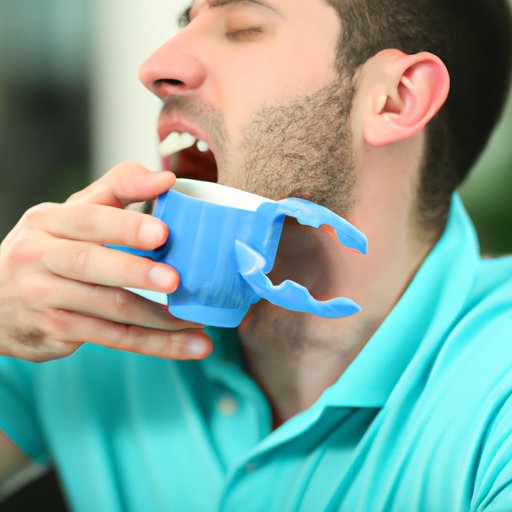Introduction
Jaw clenching, also known as bruxism, is a common problem that affects many people. It occurs when you clench or grind your teeth together during sleep. This can cause pain and discomfort in the jaw area and can even lead to headaches or earaches. Fortunately, there are several ways to stop clenching your jaw while sleeping.
Wear a Mouthguard
One of the most effective ways to stop jaw clenching while sleeping is to wear a mouthguard. A mouthguard is a device that fits over your teeth and prevents them from grinding against each other. Wearing a mouthguard can help reduce pain and discomfort in the jaw area and may even prevent future damage to your teeth.
When choosing a mouthguard, it is important to make sure it fits properly. Make sure it is comfortable and does not interfere with your breathing. You can also ask your dentist to recommend a good mouthguard for you.

Practice Relaxation Techniques Before Bed
Relaxation techniques such as meditation, yoga, and deep breathing can help relax your body and mind before bed. This can help reduce stress levels and make it easier to fall asleep. Practicing relaxation techniques can also help relieve tension in the jaw area and prevent clenching.
Try to practice relaxation techniques for at least 10 minutes before bed. This can be done in any comfortable position, such as lying down or sitting up. Focus on taking deep breaths and letting go of any tension in your body.
Avoid Caffeine and Alcohol
Caffeine and alcohol can both have an impact on jaw clenching. Caffeine can act as a stimulant and increase stress levels, which can lead to more frequent and intense episodes of jaw clenching. Alcohol can also disrupt your sleep cycle and make it harder to stay asleep, which can increase the risk of jaw clenching.
If you find that caffeine and alcohol are contributing to your jaw clenching, try reducing or eliminating your intake. If you do decide to drink caffeine or alcohol, try to do so earlier in the day so that it does not interfere with your sleep.
Massage Jaw Muscles
Massaging the jaw muscles can help relax them and reduce the risk of jaw clenching. To massage your jaw muscles, gently press your fingertips into the muscles around your jaw. Massage in small circular motions for a few minutes. You can also open and close your mouth while massaging to further relax the muscles.
You can also use a warm compress to help relax your jaw muscles. Place the warm compress on your jaw for a few minutes before bed. The heat will help relax the muscles and reduce the risk of jaw clenching.
Stretch Jaw Muscles
Stretching the jaw muscles can help reduce tension and prevent jaw clenching. Try doing simple jaw stretches before bed, such as opening your mouth wide and holding it for a few seconds. You can also try moving your lower jaw from side to side or up and down. These exercises can help loosen the muscles and reduce the risk of clenching.

Avoid Stressful Situations Before Bed
Stress can be a major contributor to jaw clenching. Avoiding stressful situations before bed can help reduce the risk of clenching. Try to minimize any activities that may cause stress in the hours leading up to bedtime. This could include avoiding work-related tasks, watching the news, or engaging in arguments.
If you find yourself feeling stressed before bed, try using relaxation techniques or deep breathing to reduce your stress levels. Taking a warm bath or shower can also help relax your body and make it easier to fall asleep.
See a Dentist or Physical Therapist
If your jaw clenching persists despite trying the above strategies, it may be beneficial to see a dentist or physical therapist. A dentist can examine your teeth and mouth to determine if there is any damage caused by clenching. They can also provide advice on how to stop clenching and recommend treatments such as mouthguards.
A physical therapist can help identify any underlying issues that may be contributing to your jaw clenching. They can provide exercises and stretches to help strengthen and relax the jaw muscles. A physical therapist can also provide guidance on how to manage stress and reduce the risk of jaw clenching.
Conclusion
Jaw clenching can be a frustrating and painful condition. Fortunately, there are several strategies you can use to help stop clenching your jaw while sleeping. From wearing a mouthguard to practicing relaxation techniques, these strategies can help reduce pain and discomfort and prevent future damage to your teeth.


